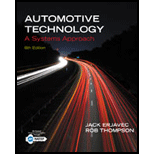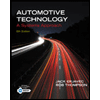
Automotive Technology: A Systems Approach (MindTap Course List)
6th Edition
ISBN: 9781133612315
Author: Jack Erjavec, Rob Thompson
Publisher: Cengage Learning
expand_more
expand_more
format_list_bulleted
Concept explainers
Textbook Question
Chapter 21, Problem 7ASRQ
The coolant temperature gauge stays low (cold) after die engine has been started and ran until the engine is hot Technician A says that the wires to the sending unit may be shorted together. Technician B says that the sending unit may be electrically open. Who is correct?
- Technician A
Expert Solution & Answer
Want to see the full answer?
Check out a sample textbook solution
Students have asked these similar questions
The lower jaw AB [Purple 1] and the upper jaw-handle AD
[Yellow 2] exert vertical clamping forces on the object at R.
The hand squeezes the upper jaw-handle AD [2] and the
lower handle BC [Orane 4] with forces F. (Member CD [Red 3]
acts as if it is pinned at D, but, in a real vise-grips, its
position is actually adjustable.) The clamping force, R,
depends on the geometry and on the squeezing force F
applied to the handles. Determine the proportionality
between the clamping force, R, and the squeezing force F for
the dimensions given.
d3
d4
R
1
B
d1
2
d2
D...
d5
F
4
F
Values for dimensions on the figure are given in the following
table. Note the figure may not be to scale.
Variable
Value
d1
65 mm
d2
156 mm
d3
50 mm
45
d4
d5
113 mm
30 mm
R =
F
A triangular distributed load of max intensity w =460 N/m
acts on beam AB. The beam is supported by a pin at A and
member CD, which is connected by pins at C and D
respectively. Determine the reaction forces at A and C.
Enter your answers in Cartesian components. Assume the
masses of both beam AB and member CD are negligible.
cc 040
BY NC SA
2016 Eric Davishahl
W
A
C
D
-a-
B
Ул
-b-
x
Values for dimensions on the figure are given in the following
table. Note the figure may not be to scale.
Variable Value
α
5.4 m
b
8.64 m
C
3.24 m
The reaction at A is A =
i+
ĴN.
λ =
i+
Ĵ N.
The reaction at C is C =
56
Clamps like the one shown are commonly used in
woodworking applications. This clamp has the dimensions
given in the table below the figure, and its jaws are
mm thick (in the direction perpendicular to the plane of the
picture).
a.) The screws of the clamp are adjusted so that there is a
uniform pressure of P = 150 kPa being applied to the
workpieces by the jaws. Determine the force carried in each
screw. Hint: the uniform pressure can be modeled in 2-D as a
uniform distributed load with intensity w = Pt (units of
N/m) acting over the length of contact between the jaw and
the workpiece.
b.) Determine the minimum vertical force (parallel to the
jaws) required to pull either one of the workpieces out of the
clamp jaws. Use a coefficient of static friction between all
contacting surfaces of μs = 0.56 and the same clamping
pressure given for part (a).
2013 Michael Swanbom
A
B
C
a
Values for dimensions on the figure are given in the following
table. Note the figure may not be to scale.…
Chapter 21 Solutions
Automotive Technology: A Systems Approach (MindTap Course List)
Ch. 21 - True or False? A driver information center...Ch. 21 - What is the purpose of an IVR?Ch. 21 - Explain how an air-core gauge works.Ch. 21 - What are two ways to provide input for the...Ch. 21 - Describe the two types of instrument panel...Ch. 21 - What is the device found in some fuel tanks to...Ch. 21 - What is the correct way to check a coolant...Ch. 21 - What type of sending unit is typically used to...Ch. 21 - What is the major difference between an indicator...Ch. 21 - True or False? The ABS lamp turns on whenever the...
Ch. 21 - The indicator needle on a speedometer is held to...Ch. 21 - Which of the following uses a permanent magnet and...Ch. 21 - What type of memory is used to store the...Ch. 21 - Which of the following is not a true statement...Ch. 21 - Which of the following statements about oil gauge...Ch. 21 - While discussing what the maintenance reminders...Ch. 21 - None of the engines gauges works: Technician A...Ch. 21 - The oil pressure light stays on whenever the...Ch. 21 - A digital speedometer constantly reads 0 mph:...Ch. 21 - All gauges operate but read lower than normal:...Ch. 21 - When testing an engine temperature sensor:...Ch. 21 - The coolant temperature gauge stays low (cold)...Ch. 21 - While discussing the instrumentation on a Toyota...Ch. 21 - The TPM warning lamp is lit: Technician A says...Ch. 21 - The yellow electronic throttle control warning...
Knowledge Booster
Learn more about
Need a deep-dive on the concept behind this application? Look no further. Learn more about this topic, mechanical-engineering and related others by exploring similar questions and additional content below.Similar questions
- Determine the force in each member of the space truss given F=5 kN. Use positive to indicate tension and negative to indicate compression. F E Z -2 m. B 3 m C 5 m 3 m A -4 m. AB = KN FAC = FAD = KN KN KN FBC = KN FBD FBE = = KN Farrow_forwardA short brass cyclinder (denisty=8530 kg/m^3, cp=0.389 kJ/kgK, k=110 W/mK, and alpha=3.39*10^-5 m^2/s) of diameter 4 cm and height 20 cm is initially at uniform temperature of 150 degrees C. The cylinder is now placed in atmospheric air at 20 degrees C, where heat transfer takes place by convection with a heat transfer coefficent of 40 W/m^2K. Calculate (a) the center temp of the cylinder, (b) the center temp of the top surface of the cylinder, and (c) the total heat transfer from the cylinder 15 min after the start of the cooling. Solve this problem using the analytical one term approximation method. (Answer: (a) 45.7C, (b)45.3C, (c)87.2 kJ)arrow_forwardA short brass cyclinder (denisty=8530 kg/m^3, cp=0.389 kJ/kgK, k=110 W/mK, and alpha=3.39*10^-5 m^2/s) of diameter 4 cm and height 20 cm is initially at uniform temperature of 150 degrees C. The cylinder is now placed in atmospheric air at 20 degrees C, where heat transfer takes place by convection with a heat transfer coefficent of 40 W/m^2K. Calculate (a) the center temp of the cylinder, (b) the center temp of the top surface of the cylinder, and (c) the total heat transfer from the cylinder 15 min after the start of the cooling. Solve this problem using the analytical one term approximation method.arrow_forward
- A 6 cm high rectangular ice block (k=2.22 W/mK, and alpha=0.124*10^-7 m^2/s) initially at -18 degrees C is placed on a table on its square base 4 cm by 4cm in size in a room at 18 degrees C. The heat transfer coefficent on the exposed surfaces of the ice block is 12 W/m^2K. Disregarding any heat transfer from the base to the table, determine how long it will be before the ice block starts melting. Where on the ice block will the first liquid droplets appear? Solve this problem using the analytical one-term approximation method.arrow_forwardConsider a piece of steel undergoing a decarburization process at 925 degrees C. the mass diffusivity of carbon in steel at 925 degrees C is 1*10^-7 cm^2/s. Determine the depth below the surface of the steel at which the concentration of carbon is reduced to 40 percent from its initial value as a result of the decarburization process for (a) an hour and (b) 10 hours. Assume the concnetration of carbon at the surface is zero throughout the decarburization process.arrow_forwardPlease do not rely too much on chatgpt, because its answer may be wrong. Please consider it carefully and give your own answer. You can borrow ideas from gpt, but please do not believe its answer.Very very grateful! Please do not copy other's work,i will be very very grateful!!arrow_forward
- Multiple Choice Circle the best answer to each statement. 1. Which geometry attribute deviation(s) can be limited with a profile of a surface tolerance? A. Location B. Orientation C. Form D. All of the above 2. A true profile may be defined with: A. Basic radii B. Basic angles C. Formulas D. All of the above 3. Which modifier may be applied to the profile tolerance value? A B C. D. All of the above 4. The default tolerance zone for a profile tolerance is: A. Non-uniform B. Unilateral C. Bilateral equal distribution D. Bilateral-unequal distribution 5. An advantage of using a profile tolerance in place of a coordinate tolerance is: A. A bonus tolerance is permitted. B. A datum feature sequence may be specified C. A profile tolerance always controls size D. All of the above 6. The shape of the tolerance zone for a profile tolerance is: A. Two parallel planes B. The same as the true profile of the toleranced surface C. Equal bilateral D. Cylindrical when the diameter symbol is speci- fied…arrow_forwardOne thousand kg/h of a (50-50 wt%) acetone-in-water solution is to be extracted at 25C in a continuous, countercurrent system with pure 1,1,2-trichloroethane to obtain a raffinate containing 10 wt% acetone. Using the following equilibrium data, determine with an equilateral-triangle diagram: a- the minimum flow rate of solvent; b- the number of stages required for a solvent rate equal to 1.5 times minimum, and composition of each streamleaving each stage. c- Repeat the calculation of (a) and (b) if the solvent used has purity 93wt% (4wr% acetone, 3wt% water impurities) acetone water 1,1,2-trichloroethane Raffinate. Weight Extract. Weight 0.6 0.13 0.27 Fraction Acetone Fraction Acetone 0.5 0.04 0.46 0.44 0.56 0.4 0.03 0.57 0.29 0.40 0.3 0.02 0.68 0.12 0.18 0.2 0.015 0.785 0.0 0.0 0.1 0.01 0.89 0.55 0.35 0.1 0.5 0.43 0.07 0.4 0.57 0.03 0.3 0.68 0.02 0.2 0.79 0.01 0.1 0.895 0.005arrow_forward2500 kg/hr of (20-80) nicotine water solution is to be extracted with benzene containing 0.5% nicotine in the 1st and 2ed stages while the 3rd stage is free of nicotine. Cross- current operation is used with different amounts of solvent for each stages 2000kg/hr in the 1st stage, 2300 kg/hr in the 2nd stage, 2600 kg/hr in the 3rd, determine: - a- The final raffinate concentration and % extraction. b- b- The minimum amount of solvent required for counter-current operation if the minimum concentration will be reduced to 5% in the outlet raffinate. Equilibrium data Wt % Nicotine in water Wt % Nicotine in benzene 0 4 16 25 0 4 21 30arrow_forward
- Quiz/An eccentrically loaded bracket is welded to the support as shown in Figure below. The load is static. The weld size for weld w1 is h1=6mm, for w2 h2 5mm, and for w3 is h3 -5.5 mm. Determine the safety factor (S.f) for the welds. F=22 kN. Use an AWS Electrode type (E90xx). 140 101.15 REDMI NOTE 8 PRO AI QUAD CAMERA Farrow_forward(read image)arrow_forwardProblem 3.30 A piston-cylinder device contains 0.85 kg of refrigerant- 134a at -10°C. The piston that is free to move has a mass of 12 kg and a diameter of 25 cm. The local atmospheric pressure is 100 kPa. Now, heat is transferred to refrigerant-134a until the temperature is 15°C. Determine (a) the final pressure, (b) the change in the volume of the refrigerant, and (c) the change in the enthalpy of the refrigerant-134a. please show Al work step by steparrow_forward
arrow_back_ios
SEE MORE QUESTIONS
arrow_forward_ios
Recommended textbooks for you
 Automotive Technology: A Systems Approach (MindTa...Mechanical EngineeringISBN:9781133612315Author:Jack Erjavec, Rob ThompsonPublisher:Cengage Learning
Automotive Technology: A Systems Approach (MindTa...Mechanical EngineeringISBN:9781133612315Author:Jack Erjavec, Rob ThompsonPublisher:Cengage Learning Automotive TechnologyMechanical EngineeringISBN:9781337794213Author:ERJAVEC, Jack.Publisher:Cengage,
Automotive TechnologyMechanical EngineeringISBN:9781337794213Author:ERJAVEC, Jack.Publisher:Cengage, Refrigeration and Air Conditioning Technology (Mi...Mechanical EngineeringISBN:9781305578296Author:John Tomczyk, Eugene Silberstein, Bill Whitman, Bill JohnsonPublisher:Cengage Learning
Refrigeration and Air Conditioning Technology (Mi...Mechanical EngineeringISBN:9781305578296Author:John Tomczyk, Eugene Silberstein, Bill Whitman, Bill JohnsonPublisher:Cengage Learning

Automotive Technology: A Systems Approach (MindTa...
Mechanical Engineering
ISBN:9781133612315
Author:Jack Erjavec, Rob Thompson
Publisher:Cengage Learning

Automotive Technology
Mechanical Engineering
ISBN:9781337794213
Author:ERJAVEC, Jack.
Publisher:Cengage,

Refrigeration and Air Conditioning Technology (Mi...
Mechanical Engineering
ISBN:9781305578296
Author:John Tomczyk, Eugene Silberstein, Bill Whitman, Bill Johnson
Publisher:Cengage Learning
Heat Transfer [Conduction, Convection, and Radiation]; Author: Mike Sammartano;https://www.youtube.com/watch?v=kNZi12OV9Xc;License: Standard youtube license